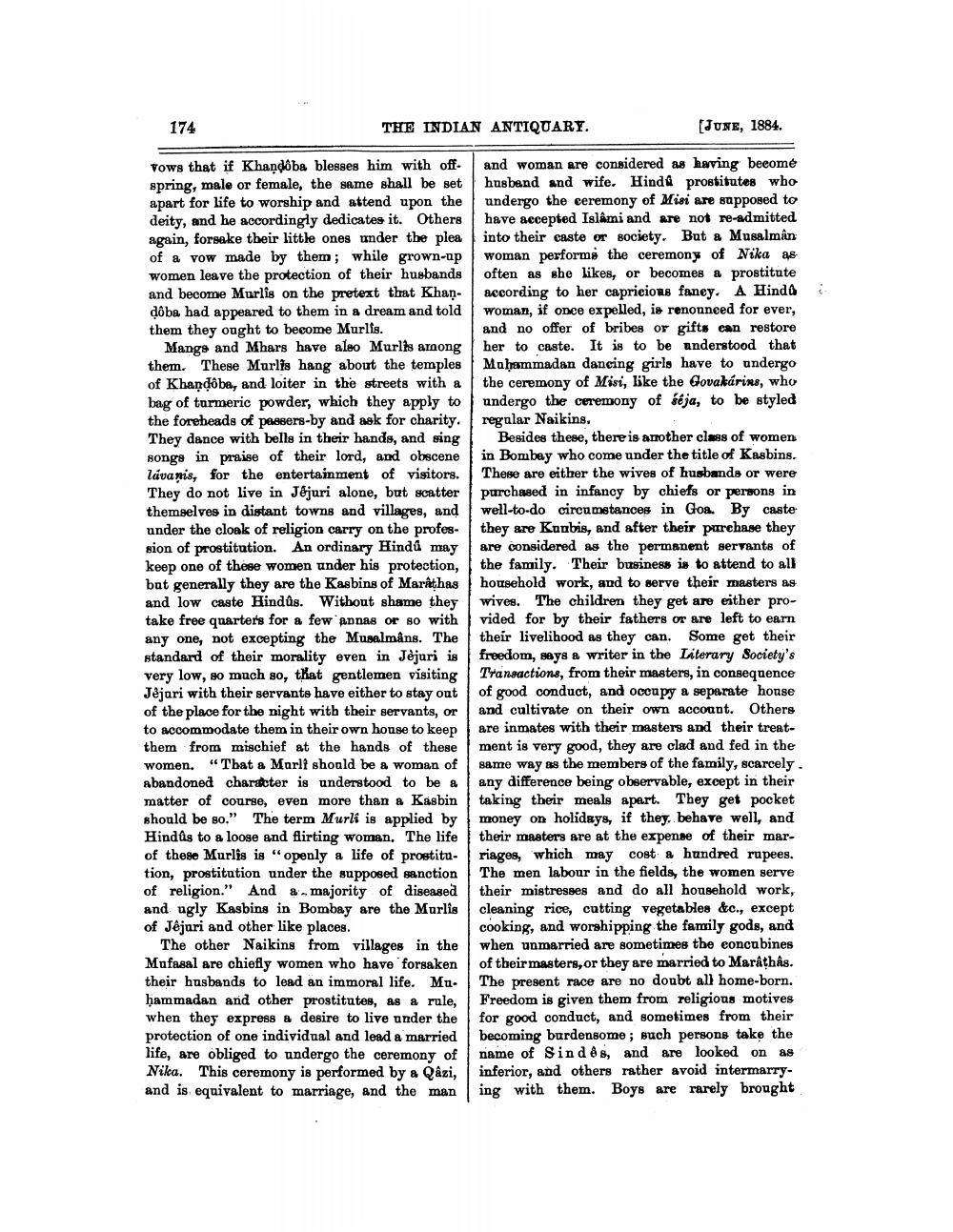________________
174
THE INDIAN ANTIQUARY.
[JUNE, 1884.
Vows that if Khandoba blesses him with offspring, male or female, the same shall be set apart for life to worship and attend upon the deity, and he accordingly dedicates it. Others again, forsake their little ones under the plea of a vow made by them; while grown-up women leave the protection of their husbands and become Murlis on the pretext that Khan. doba had appeared to them in a dream and told them they ought to become Murlis.
Mange and Mhars have also Murlts among them. These Murlis hang about the temples of Khandobe, and loiter in the streets with a bag of turmeric powder, which they apply to the foreheads of paesers-by and ask for charity. They dance with bells in their hands, and sing songs in praise of their lord, and obscene lávamis, for the entertainment of visitors. They do not live in Jējuri alone, but scatter themselves in distant towns and villages, and under the cloak of religion carry on the profession of prostitution. An ordinary Hindu may keep one of these women under his protection, bat generally they are the Kasbins of Marathas and low caste Hindus. Without shame they take free quarters for a few Annas or so with any one, not excepting the Musalmans. The standard of their morality even in Jejari is very low, so much so, that gentlemen visiting Jejari with their servants have either to stay out of the place for the night with their servants, or to accommodate them in their own house to keep them from mischief at the hands of these women. “Tbat a Marlt should be a woman of abandoned character is understood to be a matter of course, even more than & Kasbin should be so." The term Murli is applied by Hindus to a loose and flirting woman. The life of these Murlis is "openly a life of prostitu- tion, prostitution under the supposed sanction of religion." And & , majority of diseased and ugly Kasbins in Bombay are the Murlis of Jejuri and other like places.
The other Naikins from villages in the Mufasal are chiefly women who have forsaken their husbands to lead an immoral life. Ma. hammadan and other prostitutes, as a rule, when they express a desire to live under the protection of one individual and lead a married life, are obliged to undergo the ceremony of Nika. This ceremony is performed by a Qazi, and is equivalent to marriage, and the man
and woman are considered as having become husband and wife. Hinde prostitutes who undergo the ceremony of Misi are supposed to have accepted Islâmi and are not re-admitted into their caste or society. But a Musalman woman performs the ceremony of Nika 48 often as she likes, or becomes a prostitute according to her capricions faney. A Hindi woman, if once expelled, is renonneed for ever, and no offer of bribes or gifts can restore her to caste. It is to be understood that Mohammadan dancing girls have to undergo the ceremony of Misi, like the Govakárins, who undergo the ceremony of seja, to be styled regalar Naikins.
Besides these, there is another class of women in Bombay who come under the title of Kasbins. These are either the wives of husbands or were purchased in infancy by chiefs or persons in well-to-do circumstances in Goa. By caste they are Karbis, and after their purchase they are considered as the permanent servants of the family. Their business is to attend to all household work, and to serve their masters as wives. The children they get are either provided for by their fathers or are left to earn their livelihood as they can. Some get their freedom, says a writer in the Literary Society's Transactions, from their masters, in consequence of good conduct, and occupy a separate house and cultivate on their own account. Others are inmates with their masters and their treatment is very good, they are clad and fed in the same way as the members of the family, scarcely. any difference being observable, except in their taking their meals apart. They get pocket money on holidays, if they behave well, and their masters are at the expense of their marriages, which may cost a hundred rupees. The men labour in the fields, the women serve their mistresses and do all household work, cleaning rice, cutting vegetables &c., except cooking, and worshipping the family gods, and when unmarried are sometimes the concubines of their masters, or they are married to Marathas. The present race are no doubt all home-born. Freedom is given them from religious motives for good conduct, and sometimes from their becoming burdensome; such persons take the name of Sinds, and are looked on as inferior, and others rather avoid intermarrying with them. Boys are rarely brought




